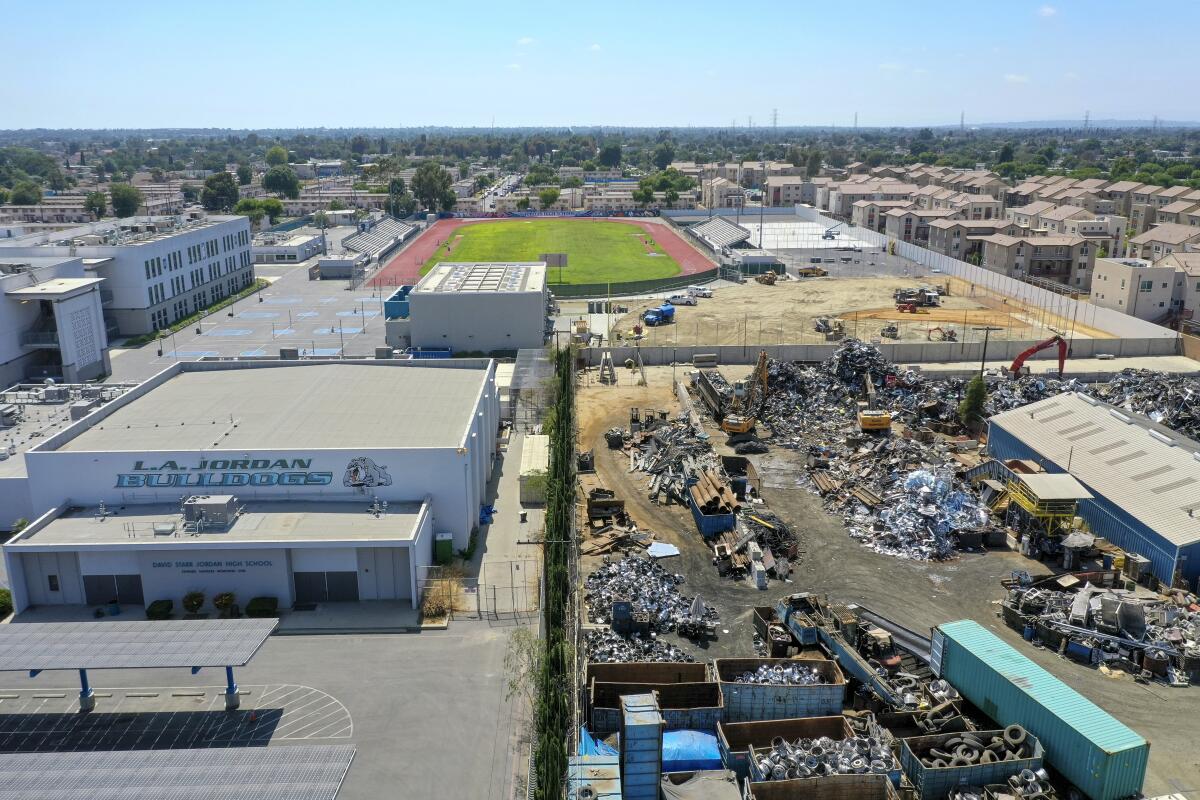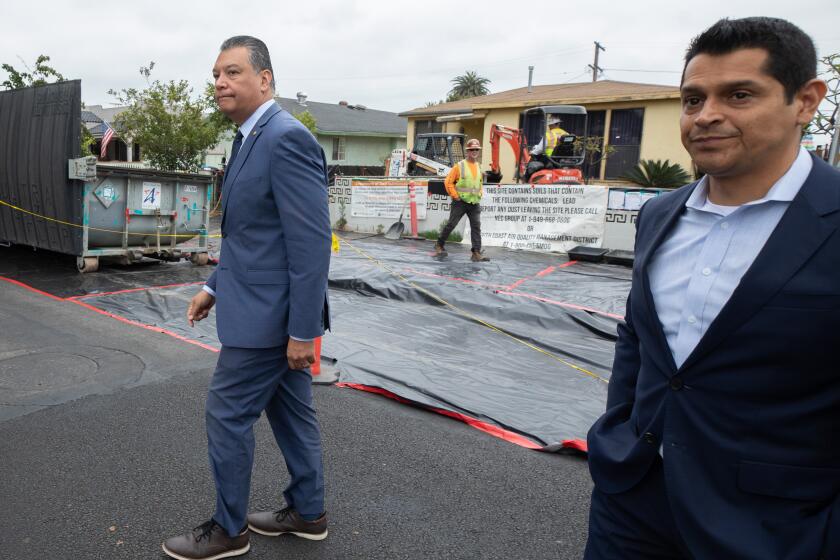Criminal charges filed against Watts metal recycler and its owners

Students and faculty at Jordan High School say they have spent decades complaining about harmful industrial operations next door to their Watts campus, but to little avail.
Piles of scrap metal have towered over a 10-foot wall separating S&W Atlas Iron & Metal from the school’s blacktop basketball court, and the company’s operations have hurled shards of metal onto school grounds and dusted the campus in an iridescent shimmer of metals.
Now, amid rising outrage from community members, L.A. County Dist. Atty. George Gascón has announced the filing of two dozen criminal charges against Atlas and its owners.
At a Wednesday news conference at Jordan High School, Gascón said his prosecutors have charged Atlas, along with father-and-son owners Gary and Matthew Weisenberg, with 22 felonies and two misdemeanors. The criminal complaint alleges the scrapyard illegally disposed of hazardous materials, including brain-damaging lead, on at least five occasions between July 2020 and August 2022.
The decision to charge company owners marks a rare prosecutorial action for an environmental crimes case, and reflects the severity of the accusations, Gascón said.
“We believe that their conduct is egregious,” he told reporters. “We believe that they have consistently avoided and evaded facing the rules of law, and we think that they are personally liable.”
Pollution from cooking with a gas stove may be on par with breathing secondhand tobacco smoke, according to new research.
Benjamin N. Gluck, an attorney representing the owners, said he still hadn’t learned the details of the charges. Gascón “declined to engage” with his clients and “chose instead to file charges,” he said.
“We were disappointed to see the charges. Atlas is actively working with the many public agencies involved and is actually moving close to a global resolution.”
An arrest warrant has been issued for the Weisenbergs, whose arraignment has been scheduled for Monday. They are expected to surrender to law enforcement before then, the D.A.’s office said.
The bombshell prosecution follows a litany of separate enforcement actions against the facility.
In recent years, the L.A. city attorney’s office and the California Department of Toxic Substances Control have each sued Atlas, hoping court orders might compel the recycling company to obey hazardous waste laws.
The Los Angeles Unified School District also filed a federal lawsuit against Atlas in 2020, asking a judge to stop the company from “continuing to allow dangerous, sharp metal projectiles, fine metallic dust and other objects to be launched or emitted from their property” onto the Jordan campus.
Alberto M. Carvalho, LAUSD superintendent who joined Gascon in Wednesday’s announcement, said the district is “in the final stages of that lawsuit.” When Carvalho stepped into his role 15 months ago, he said concerns from staff and students regarding Atlas were one of the first items he was briefed on. He learned of tremors from heavy machinery, high-speed debris and, of course, the pollution.
“Ordinarily, not only is it loud, the ground vibrates — buildings vibrate,” Carvalho said.
“This wing here,” he said while walking through a corridor of school buildings, “regularly was hit with projectiles. The baseball diamond is just behind the practice gym. The football field is 50 yards away. Both of them were constantly pelted with shrapnel. When you look at that, we have to take action.”
He met with residents who live near the former Exide battery plant and called for federal Superfund status.
The high school opened in 1923 while the metal recycler began operating next door in 1949, exposing generations of students to developmentally stunting lead and other harmful substances. Carvalho said these issues should not have persisted for 70 years.
“If appropriate rules and laws have been followed, we would not be where we are,” Carvalho said. “It’s not that there’s a lack of legislation, it’s a lack of enforcement.”
Community activist Timothy Watkins echoed the superintendent’s sentiments, adding they’re seeking not only compliance, but the facility’s ouster altogether.
“What I’m tired of is that you’ve got agency heads ... that are supposed to enforce the rules and laws, and it seems that they’re more intent on remediation than a healthy dose of mitigation,” Watkins said.
Perhaps no one was more pleased with the announcement than Jordan students themselves, including recent graduate Genesis Cruz. To obtain her diploma, she endured nauseating fumes, a lead-contaminated campus and worries over how her health could be affected.
The worst part, she said, was believing that nobody cared enough to take action.
“This was our normal, but it was not normal,” she said. “One of the most distressing aspects was a feeling that nobody in power cared about the students at Jordan High School. Our pleas for help and attention were consistently ignored. It seemed as though our voices were being muffled and our concerns were dismissed as insignificant.”









